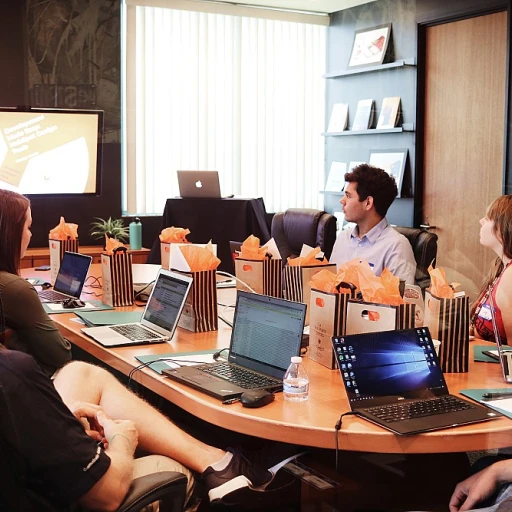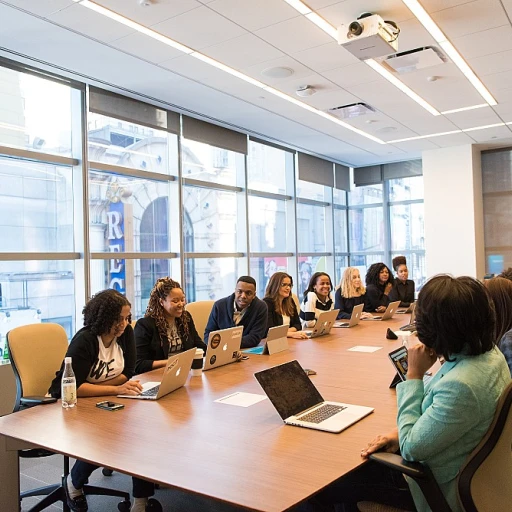
Understanding the Role of a Skills Trainer
Understanding the Impact of a Skills Trainer
The role of a skills trainer is pivotal in today's rapidly changing job landscape. These professionals are the linchpins of reskilling endeavors, responsible for equipping participants with the knowledge and capabilities required to thrive in diverse roles. A skills trainer is not just an instructor but a facilitator of growth, actively engaged in nurturing the potential of individuals through tailored training sessions.
One of the core responsibilities of a skills trainer is to deliver content that bridges the gap between current abilities and future needs. This involves not only knowledge transfer but also instilling life skills such as problem solving and time management. Trainers must employ a variety of methods to ensure that learning is both effective and engaging, from dynamic training sessions to interactive programs that foster active participation.
Communication skills are another critical component of a skills trainer's toolkit. The ability to adapt messaging based on the audience's understanding is crucial to ensure that information is comprehensively absorbed. Coupled with active listening and engagement skills, trainers can create an environment where participants feel supported and motivated.
A skills trainer must also exhibit robust management skills. Time management, resource allocation, and session planning are all crucial to the smooth operation of training programs. Given the demands of trainer jobs, managing multiple priorities without compromising on quality is essential.
For those aspiring to a role in this dynamic field, it is beneficial to explore how effective store onboarding can enhance employee skills, providing insights into diverse approaches that address varying learning needs. More information can be found on enhancing employee skills through effective store onboarding.
In essence, skills trainers are instrumental in transforming the workforce, helping individuals transition smoothly into new roles and thereby fostering a culture of continuous learning and adaptation. As organizations prioritize reskilling initiatives, the expertise of skills trainers will remain indispensable, ensuring that training content aligns seamlessly with business objectives and individual aspirations.
Identifying Key Skills for Future Success
Future-Proofing Skills for Tomorrow's Workplace
As we navigate a rapidly evolving job market, it's increasingly important to identify and develop key skills that will ensure success in the future. Skills trainers play a crucial role in helping individuals not only bridge the gap in emerging job skills but also in fostering essential life skills that enhance employability and adaptability. To address future needs, skills trainers focus on several core areas:- Communication Skills: Effective communication remains a cornerstone in any professional setting. Trainers work with participants to boost their engagement skills and mastery in active listening, which are invaluable across various roles.
- Problem Solving: Trainers emphasize critical thinking and creative problem-solving techniques that empower individuals to tackle challenges proactively and innovate within their respective fields.
- Time Management: In a world where multitasking is often inevitable, being skilled in time management allows participants to optimize their efficiency and productivity, which is a highly sought-after trait in today's fast-paced work environments.
- Mental Health Awareness: Acknowledging the importance of mental health, skills training programs increasingly incorporate strategies for managing stress and maintaining work-life balance, ensuring participants are well-rounded and resilient.
Challenges in Reskilling and How Trainers Overcome Them
Tackling Challenges in Reskilling: Strategies for Trainers
Reskilling efforts are essential in today's fast-evolving job market, but they are not without their challenges. Skills trainers play a pivotal role in navigating these complexities, ensuring participants acquire the necessary job skills and knowledge. Managing time effectively is one of the primary hurdles. Trainers must balance between various training sessions, programs, and their own trainer jobs, all while ensuring the learning process remains engaging and productive. Time management skills are crucial in organizing content delivery and maintaining the quality of training sessions. Communication plays a vital role too. Trainers need to possess strong communication skills to convey complex information clearly and foster a supportive learning environment. Active listening and engagement skills help trainers to address participants' unique needs and encourage a two-way dialogue, paving the way for effective learning. Another significant challenge is tailoring training programs to align with the diverse backgrounds and skill levels of participants. Personalized training approaches are crucial to accommodate various learning paces and preferences, creating an inclusive space that fosters growth. Skills trainers must identify participants' strengths and areas for improvement, employing problem-solving techniques to customize learning paths as required. Furthermore, keeping up with the rapid technological advancements used in training contexts can be demanding. Trainers need to stay informed about the latest tools available for skills training, such as management software and digital learning platforms. This knowledge allows for the seamless integration of technology into training sessions, enhancing the overall experience and effectiveness of reskilling initiatives. Despite these challenges, skills trainers are dedicated to providing valuable support to applicants and participants. They play a key role in facilitating successful reskilling by adapting to new circumstances and continuously updating their methodologies. To explore more strategies in overcoming these challenges, read about choosing the right training culture for reskilling, which can provide further insights into effective training models.Personalized Training Approaches
Tailoring the Learning Experience
In the constantly evolving landscape of reskilling, one approach stands out for its effectiveness: personalized training. A one-size-fits-all strategy is often inadequate when dealing with the complexities and diverse backgrounds of learners. Skills trainers understand the importance of tailoring their sessions to address the specific needs of each participant. This approach not only maximizes the impact of the training program but also greatly enhances the overall learning experience.
To achieve this, trainers employ various methods that cater to individual learning styles and cognitive needs. Active listening and effective communication skills play a pivotal role in tailoring content appropriately. By engaging directly with participants, trainers can assess their current job skills and identify gaps in their knowledge that need addressing. This customized approach helps build life skills and enhance problem-solving abilities, which are crucial in adapting to new job requirements.
Strategic Use of Resources
A significant element of personalized training involves the strategic use of both time and technological tools. Time management is essential for trainers aiming to deliver concentrated yet comprehensive training sessions. By efficiently organizing time and resources, trainers can ensure that every moment in the training session contributes value to the learning journey.
Furthermore, trainers often leverage advanced management tools and online platforms to support this individualized approach. These tools enable the customization of training content and allow for the integration of a diverse range of training methods, making learning more accessible and engaging for all involved. The use of such technological tools not only enriches the programs but also supports mental health by reducing stress and ensuring that training sessions fit seamlessly into the learner's schedule.
Fostering Engagement and Retention
To maintain engagement and enhance retention, trainers frequently incorporate elements that support participation and active involvement during training sessions. The skills trainer’s role includes facilitating discussions, encouraging questions, and promoting a culture of inclusive dialogue, which helps in building strong communication skills and engagement skills. This participatory approach not only aids in the retention of learned content but also empowers participants to continue their education and apply newly acquired skills effectively in real-world scenarios.
The commitment to personalization means trainers must continually refine their techniques to ensure they provide the most relevant and impactful support to each participant. This dynamic approach positions them as key catalysts for reskilling, helping to prepare candidates efficiently for the challenges and opportunities in their prospective jobs across the United States.
Technological Tools for Effective Training
Leveraging Technology to Enhance Training Effectiveness
In the rapidly evolving domain of reskilling, the integration of technological tools is transforming training programs. Skills trainers today are compelled to harness these innovations to deliver impactful learning experiences. The challenge, however, lies in selecting the right tools that align with the training objectives and the participants' needs.
Effective skills trainers utilize a suite of digital tools to facilitate diverse training sessions. These tools range from advanced learning management systems (LMS) that customize content delivery to virtual reality simulations that offer authentic engagement. Such tools not only help in imparting job skills but also in enhancing the life skills of participants, promoting both active learning and engagement skills.
Incorporating these tools requires a combination of technical knowledge and adaptive trainer skills. Trainers must stay ahead of technological trends, ensuring their training sessions are equipped to meet the demands of the future workforce. Moreover, trainers benefit from tools that offer analytics to measure training effectiveness, thereby providing vital data to refine programs and ensure they meet the strategic goals of reskilling initiatives.
Utilizing technological tools effectively also improves time management and communication skills. Trainers can structure content that is concise and relevant, optimizing time spent with participants during a training session. Moreover, technologies enable remote learning, thereby expanding access to those in different geographical locations, including the United States, emphasizing inclusivity in reskilling efforts.
In conclusion, technology acts as a catalyst in reskilling processes, offering both skills trainers and applicants the opportunity to engage in enriched learning environments. As trainers continue to adapt and evolve, the challenge remains in balancing technological adoption with the tailored, human-centered approaches so critical to lasting skill development and personal growth.













